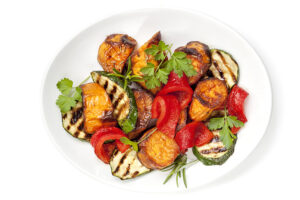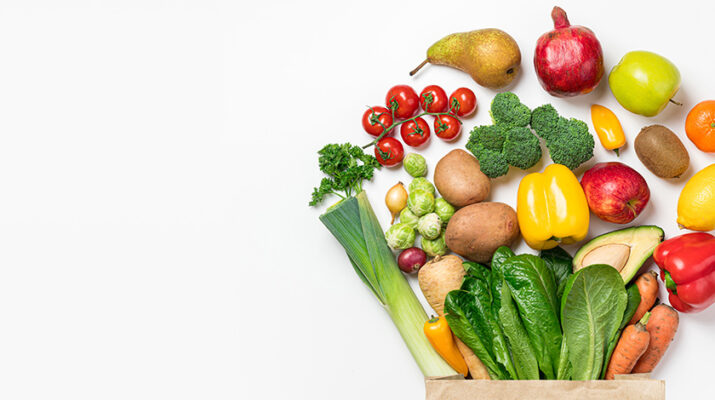By Deborah Jeanne Sergeant
You can enjoy better health by making a few changes this summer.
1 — Use the longer days in healthful ways
 Kerri Howell, certified personal trainer, nutrition coach and owner of The Hourglass Mom in the Rochester area, suggested using summer’s increased daylight hours for “exercise, journaling or eating a healthy breakfast.” More daylight can also help re-establish a healthy circadian rhythm for restorative sleep. “Whether it’s an evening stroll or an afternoon hike, it’s easier to get outside and get moving when the weather is nice,” Howell said.
Kerri Howell, certified personal trainer, nutrition coach and owner of The Hourglass Mom in the Rochester area, suggested using summer’s increased daylight hours for “exercise, journaling or eating a healthy breakfast.” More daylight can also help re-establish a healthy circadian rhythm for restorative sleep. “Whether it’s an evening stroll or an afternoon hike, it’s easier to get outside and get moving when the weather is nice,” Howell said.
2 — Focus on self-care
“Especially if you’re a parent, we end up with a lot more time on our hands,” Howell said. “When school’s out, so are many of the extracurricular activities or they shift a bit so you’re not constantly on the run, tiring yourself out. More time means capacity to focus on yourself and your goals.” At some workplaces, this is also true, especially at companies that keep shorter “summer hours.”
3 — Get grilling
 “Grilling means easy, healthy dinners,” Howell said. “Plus, meal prep is a cinch when you’ve got the grill going.” For example, fill up skewers with veggies like cherry tomatoes, mini sweet peppers and quartered onions, along with chunks of boneless, skinless chicken breast and serve grilled skewers over a salad.
“Grilling means easy, healthy dinners,” Howell said. “Plus, meal prep is a cinch when you’ve got the grill going.” For example, fill up skewers with veggies like cherry tomatoes, mini sweet peppers and quartered onions, along with chunks of boneless, skinless chicken breast and serve grilled skewers over a salad.
4 — Buy local produce
Whether from a farm stand, farmers’ market or community supported agriculture (CSA), Sue Czap, registered dietitian with URMC, encourages buying local fruits and vegetables. “A CSA is a good thing to do,” she said. “Then you get fresh produce on a regular basis. You may try produce you haven’t before.” Her CSA includes recipes, so customers know what to do with less well-known veggies. In general, a CSA is an agreement in which a consumer pays upfront for the farm’s produce for the season. Each week for a pre-designated time period, the customer receives a box (“share”) of the farm’s harvest. Some farms allow CSA customers to help harvest and some sell other local products in their shares, such as maple syrup, honey, baked goods and jam.
5 — Pick your own produce
In addition to obtaining fresher, lower-cost produce, picking your own fruits and vegetables helps kids better understand the source of their food. Many farms offer U-pick experiences that include other activities. Visit www.pickyourown.org to find out where to go.
6 — Raise your own fruits and vegetables
Gardening often encourages children to feel more vested in their food. “You can grow tomatoes in a container garden or green beans,” Czap said. “They grow pretty easily and are kid-friendly.” Herbs are also easy to grow in pots indoors or on a patio.
7 — Preserve some produce
Although you may not “put up” every fruit and vegetable you’ll eat for the year like your great grandma did, freezing berries during their peak can save money on food costs later. “You can put them in smoothies or use in other ways,” Czap said. “If you freeze berries individually, you can pull them out individually too.” Spread washed, drained berries on a baking sheet to freeze for 30 minutes before placing them in freezer bags to avoid dealing with a solid block of berries later.
8 — Drink more water
 Czap warned that many people drink far too many calories and too much sugar in their summertime beverages, from soda to energy drinks to sweet tea. “Try to minimize your intake of sugary beverages because of the extra calories and sugar.” she said. “Plain club soda that’s flavored is great. Pick ones without added sugars or artificial sweeteners.” Unsweetened tea or ice water with fruit, vegetables or herbs can help skip calories while keeping hydration interesting.
Czap warned that many people drink far too many calories and too much sugar in their summertime beverages, from soda to energy drinks to sweet tea. “Try to minimize your intake of sugary beverages because of the extra calories and sugar.” she said. “Plain club soda that’s flavored is great. Pick ones without added sugars or artificial sweeteners.” Unsweetened tea or ice water with fruit, vegetables or herbs can help skip calories while keeping hydration interesting.
9 — Load up on whole foods
Picnics, festivals and parties are easy places to find processed foods, like hot dogs, fried foods and fatty meat. “Eat food as close to its natural state,” Czap advised. This strategy helps reduce intake of sodium, fat, additives and excess calories. Grilled chicken breast or fish, corn on the cob, and fresh fruit salad are a few examples of healthful, whole-food-based summertime fare.
10 — Remember summer activity safety
 For example, when hiking, “check yourself and pets and kids for ticks,” said Christy L. Richards, registered nurse and health educator at Ontario County Public Health. “They like those warm areas. They start at a sock and go up to the groin. We find them behind the ears. Watch for those telltale bullseye rash.” She also reminds bike riders to wear helmets, including adults. While engaging in water activities, wear a life jacket. “Visit the YMCA and get the kids into swim lessons,” Richards added. “It’s super important.”
For example, when hiking, “check yourself and pets and kids for ticks,” said Christy L. Richards, registered nurse and health educator at Ontario County Public Health. “They like those warm areas. They start at a sock and go up to the groin. We find them behind the ears. Watch for those telltale bullseye rash.” She also reminds bike riders to wear helmets, including adults. While engaging in water activities, wear a life jacket. “Visit the YMCA and get the kids into swim lessons,” Richards added. “It’s super important.”

